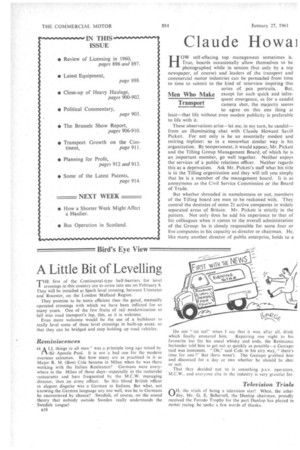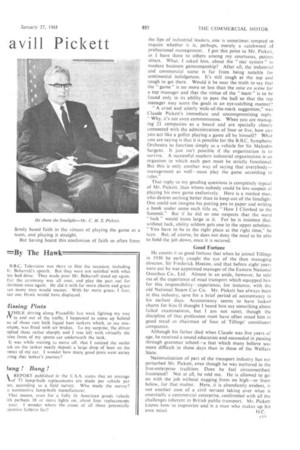Claude Howa] avill Pickett
Page 26

Page 27

If you've noticed an error in this article please click here to report it so we can fix it.
HOW self-effacing top management sometimes is. photographed while in session (but only by a top True, boards occasionally allow themselves to be newspaper, of course) and leaders of the transport and commercial motor industries can be persuaded from time to time to submit to the kind of interview inspiring this
series of pen portraits. But, except for such quick and infre quent emergence, as for a candid
Transport camera shot, the majority seems to agree on this one thing at least—that life without even modest publicity is preferable
to life with it. .
These observations arise—lei me, in my turn, be candid-from an illuminating chat with Claude Howard Savill Pickett. For not only is he an essentially modest and retiring topiiner: so in a somewhat similar way is his organization. By temperament, it would appear, Mr. Pickett and the Tilling Group Management Board, of which he is an important member, go well together. Neither enjoys the services of a public relations officer. Neither regards this as a deprivation. Ask Mr. Pickett's staff what his title is in the Tilling organization and they will tell you simply that he is a member of the management board. It is as anonymous as the Civil Service Commission or the Board of Trade.
But whether shrouded in namelessness or not, members of the Tilling board are men to be reckoned with. They control the destinies of some 21 active companies in widely separated areas of Britain: Mr. Pickett is strictly in the pattern. Not only does he add his experience to that of his colleagues when it comes to the overall administration of the Group: he is closely responsible for some four or five companies in his capacity as director or chairman. He, like many another director of public enterprise, holds to a firmly based faith in the virtues of playing the game as a team, and playing it straight.
But having heard this confession of faith so often from
the lips of industrial leaders, one is sometimes tempted to inquire whether it is, perhaps, merely a catchword of professional management. I put this point to Mr. Pickett, as I have done to others among my courteous, patient sitters, What, I asked him, about the "star system " in modern business gamesmanship? After all, the industrial and commercial scene is far from being notable for sentimental indulgences. It's still tough at the top and tough to get there. Would it be near the truth to say that the game " is no more or less than the mise en scene for a top manager and that the virtue of the " team " is to be found only in its ability to pass the ball so that the top manager may score the goals in an eye-catching manner?
"A cruel and utterly wide-of-the-mark suggestion," was Claude Pickett's immediate and uncompromising reply. "Why, it's not even commonsense. When you are managing 21 companies as a board and are specially closely connected with the administration of four or five, how can you act like a golfer playing a game all by himself? What you are saying is that it is possible for the B.B.C. Symphony Orchestra to function simply as a vehicle for Sir Malcolm Sargent. It just isn't possible if the organization is to survive. A successful modern industrial organization is an organism in which each part must be strictly functional. But this is only another way of saying that everybody— management as well—must play the game according to rules."
That reply to my goading questions is completely typical of Mr. Pickett, than whom nobody could be less suspect of playing his own game exclusively. Here is a modest man, who desires nothing better than to keep out of the limelight. One could not imagine his putting pen to paper and writing a book under some such title as, "How I Climbed to the Summit." But if he did so one suspects that the word "luck " would loom large in it, For he is insistent that. without luck, ability seldom gets one to the upper echelons. "You have to be in the right place at the right time," he says. But, of course, he does not deny the need to be able to hold the job down, once it is secured.
Good Fortune He counts it as good fortune that when he joined Tillings in 1930 he early caught the eye of the then managing director, Sir Frederick Heaton, and that before eight years were out he was appointed manager of the Eastern National Omnibus Co., Ltd. Almost in an aside, however, he told me of the experience of road transport which equipped him for this responsibility—experience, for instance, with the old National Steam Car Co. Mr. Pickett has always been in this industry, save for a brief period of accountancy in his earliest days. Accountancy seems to have lacked charm for him (1 thought I heard him say something about failed examinations, but I am not sure), though the discipline of that profession must have often stood him in good stead as chairman of four of Tillings' constituent companies.
Although his father died when Claude was five years of age, he received a sound education and succeeded in passing through grammar school—a feat which many believe was more difficult in those days than in these of the Welfare State.
Nationalization of part of the transport industry has not perturbed Mr. Pickett, even though he was nurtured in the free-enterprise tradition. Does he feel circumscribed, frustrated? Not at all, he told me. He is allowed to get on with the job without nagging from on high—or from below, for that matter. Here, it is abundantly evident, is not another case of a civil servant taking over what is essentially a commercial enterprise, confronted with all the challenges inherent in British public transport. Mr. Pickett knows how to improvize and is a man who makes up his
own mind. H.C.
















































































































